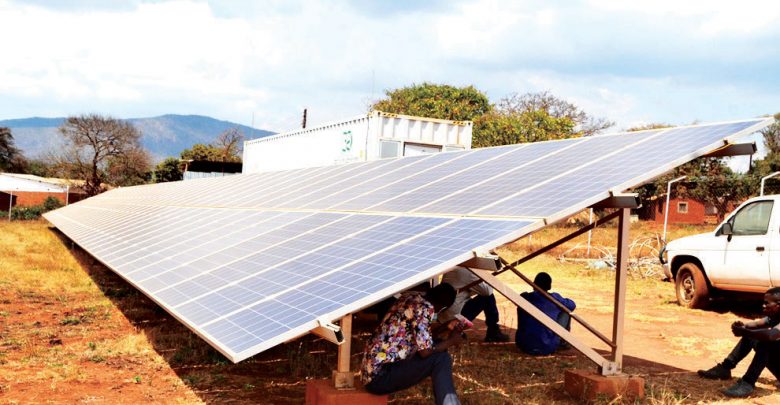

The people of Sitolo, Ndawambe and Molosiyo villages in Mchinji District are filled with joyous excitement because darkness has finally given way to light.
For decades, the villages have been without electricity despite being located 18 kilometres (km) from Mchinji Boma and 12km from the national grid.
Thus, for years, the communities used to travel miles and miles to access milling and phone charging services at Mwami Border in Zambia.
But this is mere history today! The people of the three villages have power at their fingertips, thanks to Enviroearth, which is implementing a 80 kilowatt peak power (kWp) photovoltaics solar hybrid mini-grid through.
Sitolo Solar Power Photovoltaics Mini-grid is a project funded by United Nations Development Programme (UNDP) and the Global Environment Facility (GEF).
It is being implemented with the collaboration of Community Energy Malawi (CEM).
So far, the mini-grid has connected electricity to 671 households, grocery shops, salons and barbershops, bars, two maize mills, a local school and health clinic as well as six streetlights.
Anne Nyendwa, owner of one of the successful grocery shops in Sitolo Village, said installation of the electricity in her shop had helped her increase sales in her business.
“I make K500,000 worth of sales per day. People from distant villages come here to drink frozen beverages. I am very happy because we are at par with those living in urban areas,” she smiled.
Nyendwa disclosed that the coming of power into her compound also inspired her to venture into animal production from which she gets manure for use at her farm.
This has helped her double the harvest at her farm.
“This year, realised more than 600 bags of maize weighing 50 kilogrammes each,” Nyendwa narrated.
Group Village Head Sitolo described the solar-generated power as a miracle and salvation because people do not have to cover long distances any longer to access services that require electricity.
He said, among other, the project has boosted social and economic enterprises in the area.
“We have seen businesses sprouting up in this area, which has resulted in the transformation of people’s lives. Before the project, our subjects used to go to cross the border to mill their grain, but this is now history,” Sitolo said.
Sitolo added that introduction of solar powered electricity has reduced their overdependence on firewood.
“With this power, households are able to cook and heat their bath water. And this is helping women and girls to invest their time in productive enterprises such as businesses and studies, unlike in the past when women and girls would spend hours fetching,” he narrated.
The project’s powerhouse technician, Peter Davison Banda, lamented that out of the 80kWp the system is producing, only 10.5kWp is being used, with the remainder being wasted.
Banda said they are mobilising households from neighbouring villages to apply for connection.
“Our connection fee is as cheap as K20,000 for both domestic and business. We have enough power to supply to 970 households,” he said.
According to CEM, the system coverage could include more households and other productive uses such as milk cooling and metal workshops.
CEM Country Director, Edgar Kapiza Bayani, disclosed that the project has resulted in the birth of a sunflower cooking oil refinery in Ndawambe.
Bayani said the company would eventually offer market opportunity to the many sunflower farmers in the area.
The Malawi Energy Regulatory Authority (Mera) recently embarked on a campaign aimed at motivating, incentivising and promoting mini-grids sprouting across the country.
Mera spokesperson Fitina Khonje said the initiative is aimed at ensuring that the country has adequate power that can meet the ever-increasing demand for electricity among Malawians.
Khonje said, in a country where less than 12 percent of the population are connected to electricity, it is imperative that the authority promotes mini-grids as an alternative source of energy Malawians can use to power their houses and business facilities.
Mera is mandated to regulate the energy sector and licence energy undertakings as defined in Section 9 of the Energy Regulation Act 2004 and this includes licencing of energy undertakings, approving tariffs, and prices of energy sales and services and monitoring and enforcing compliance by licencees with licences.
And under Section 9 (2) of the Act, Mera is mandated to facilitate increasing access to energy supplies and promote the exploitation of renewable energy resources.
However, Khonje emphasized that, as mini grids sprout, it is the duty of the authority to develop and enforce performance and safety standards for energy exploitation, production transportation and distribution.
She said this is to ensure safety of users as well as producers themselves.
“While electricity is very important, it can also be very dangerous. If not been handled well,” Khonje said.
Source: The Daily Times_September 7, 2021-By Watipaso Mzungu
